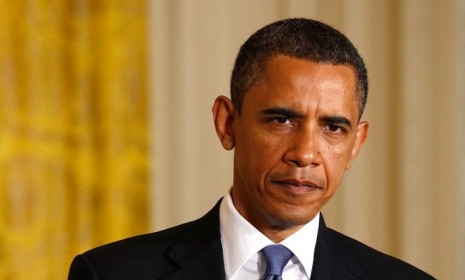Obama's 'secret' war on terrorism
Will using drones to take out al Qaeda suspects in more than a dozen countries help keep America safe?

A free daily email with the biggest news stories of the day – and the best features from TheWeek.com
You are now subscribed
Your newsletter sign-up was successful
The Obama administration is conducting a "shadow war" on al Qaeda and its allies in a dozen countries, from Yemen to Pakistan to several former Soviet republics, according to a report in The New York Times. The stealth operations, which include intelligence gathering and drone strikes, began during the presidency of George W. Bush, but it have been expanded under Obama. The program amounts to using a "scalpel" rather than a "hammer" to fight terrorism, says John O. Brennan, Obama’s top counterterrorism adviser. Is this new approach making America safer? (Watch a CNN discussion about Obama's "secret" war)
Sounds like an effective way to fight terrorists: "I like the idea of using a scalpel rather than a hammer," says James Joyner at Outside the Beltway. It means the fight against al Qaeda won't end after the Afghan surge is over and the Iraq drawdown is complete. It also means that despite the right's fear that Obama is "a secret pacifist who wanted to end the war on Islamic extremists," he's actually continuing Bush's national security policy with "nuanced differences."
"Obama's shadow war on terror"
The Week
Escape your echo chamber. Get the facts behind the news, plus analysis from multiple perspectives.

Sign up for The Week's Free Newsletters
From our morning news briefing to a weekly Good News Newsletter, get the best of The Week delivered directly to your inbox.
From our morning news briefing to a weekly Good News Newsletter, get the best of The Week delivered directly to your inbox.
We're driving recruits into al Qaeda's arms: This shadow war isn't making Americans any safer, says Jeralyn Merritt at TalkLeft. Airstrikes in Yemen, some of them botched, haven't eroded al Qaeda's capabilities in the region, and appear to be helping terrorists convince recruits they're fighting a heroic struggle against American aggression. "Instead of ramping up military strikes we should be providing developmental aid" to reduce the poverty that feeds terrorism.
"Obama administration's expansion of the war on terror abroad"
Exposing the secret war is what helps the enemy: If liberals are worried about creating more terrorists, says William Teach at Right Wing News, why is a liberal newspaper like The New York Times blowing the lid off Obama's secret war? Recklessly exposing our clandestine operations in Yemen "could do irreparable harm to our dealings" with that country's government, and further inflame a population already "ripe with hard core Islamists."
"NY Times exposes yet more secrets from the war against terrorism"
A free daily email with the biggest news stories of the day – and the best features from TheWeek.com
-
 How the FCC’s ‘equal time’ rule works
How the FCC’s ‘equal time’ rule worksIn the Spotlight The law is at the heart of the Colbert-CBS conflict
-
 What is the endgame in the DHS shutdown?
What is the endgame in the DHS shutdown?Today’s Big Question Democrats want to rein in ICE’s immigration crackdown
-
 ‘Poor time management isn’t just an inconvenience’
‘Poor time management isn’t just an inconvenience’Instant Opinion Opinion, comment and editorials of the day